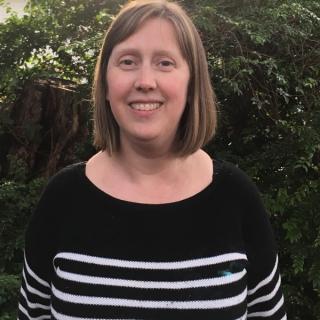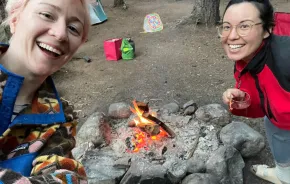
Photo:
Rep. Stephanie McClintok wants phones out of the classroom. Photo credit: Will Austin
When Surgeon General Vivek Murthy released his public advisory detailing the effects of social media on the mental health of American youth last spring, it echoed what many parents, caregivers, educators and health-care providers had long suspected: that social media can be harmful to young people, and that its use is widespread among teens and tweens.
The report highlights the urgency of the situation and offers support to many parents who are feeling overwhelmed by social media’s ever-changing landscape and the safety concerns it poses. The advisory calls on policymakers, technology companies and researchers to provide much-needed “information and tools to make social media safer for children.” As with so many parenting challenges, we have discovered once again that it takes a village.

Families in Washington state can now count two more advocates in their village: Delaney Ruston, M.D., and state Rep. Stephanie McClintock.
While filming her groundbreaking documentary “Screenagers” with film partner Lisa Tabb, Ruston was struck by the increasing number of students absorbed in their cell phones. She knew, through discussion with teachers and students and her familiarity with emerging research, that this digital immersion came with significant drawbacks: declining academic performance, less time with teachers and peers, and a surge in cyberbullying.
While research into smartphone use in schools was being conducted, Ruston noticed research on effective school policies was lacking. So she and Tabb conducted their own research, later published by CNN. Their findings uncovered problem areas. More than half of the country’s middle schools allowed students to carry cell phones throughout the day, while at the same time more than 80 percent of parents expressed a desire to prohibit their children from using phones during school hours.
McClintock had made similar observations, albeit on a smaller scale. She noticed how frequently she and her two kids (then in high school) would pick up their phones without much thought. When she served on the Battle Ground Public Schools’ board of directors (2013–17), she noticed similar behavior — “students walking around like zombies, staring at their phones.” Like Ruston, she’s concerned about the link between cell phone use and declining academic performance, specifically as it relates to state test scores.
McClintock’s concerns and discussions with school leaders in her district prompted her to sponsor HB 2018, restricting cell phone use in public schools, during the 2023–24 legislative session. Although the bill passed out of committee, it never got a hearing on the floor. Had it passed, the bill would have stipulated two years of research piloting Away for the Day in area schools to determine best practices. The program, designed by Ruston and Tabb, equips parents, teachers and school leaders with the necessary tools to institute effective policies requiring phones to be put away. She has plans to reintroduce the bill next year. “It’s unhealthy for our kids, and we need to start looking at what’s best for these kids,” she explains.
Ruston reminds parents that they can visit the Away for the Day website and get information to take to their school administration to petition for change. “It is time that we do not put it upon our students to be able to resist all that pulls at them on their devices.”
What book or podcast are you recommending right now?Ruston: I thoroughly enjoyed Frances Haugen’s book “The Power of One.” She was the whistleblower for Meta (formally Facebook), and her insights into the behind-the-scenes of that company and others have given me a lot of great information to discuss with my kids. McClintock: Right now I’m trying to keep up with my legislative work and my regular day job! The last book I read was by Brené Brown. How can parents teach children to repair a broken world?Ruston: Remember that each time we organize small do-good events, this has a major impact on our kids’ sense of agency to make changes. For example, with my kids, we organized neighbors to Beautify Our Planet (BOP) with us on various occasions. We would have fun walking around and clearing up the neighborhood all together. McClintock: Teaching kids to be compassionate and to have the ability to see other points of view are crucial. Parents have to model that and have those discussions with their kids. What daily habit or routine is most important to you?Ruston: Connecting with people. That can be a call with my kids or striking up a conversation with a stranger at the pickleball court. Human connections are the anchor for my emotional well-being. When I am adrift, having a conversation with a dear person will help ground me back in goodness. McClintock: I need my morning routine of my coffee and breakfast smoothie to get me going. I also need to get outside and take a walk daily to clear my head and get some fresh air. |











